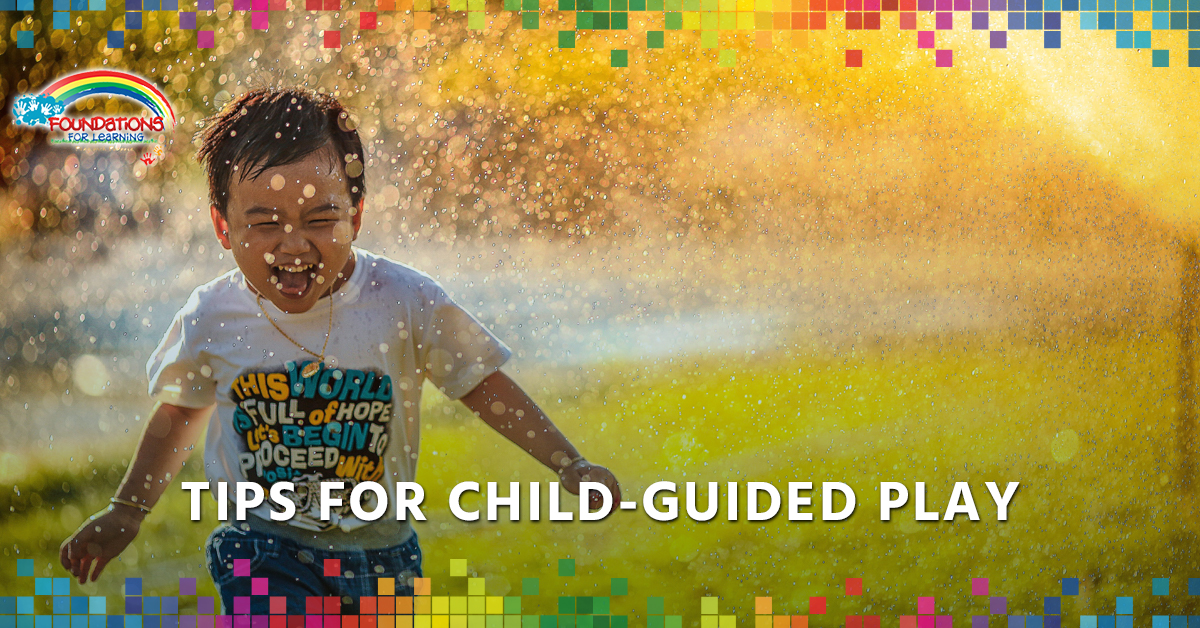Tips for Child-Guided Play

These days, much of children’s lives are rigidly structured. They follow a daily routine at home, go to preschool every day, and then have a series of activities that are laid out for them by their parents. While consistency is important for children, a lack of free-time means that they aren’t able to explore themselves and the world around them as organically. Many parents don’t prioritize giving their child time to just play, thinking that they will benefit more from structured, adult-led activities. In reality, play is essential for development, and it’s important to allow your child to explore and play independently.
Why is Play Important?
Play is an important part of a child’s life. When children are allowed to play how they see fit, they can use their imaginations to explore and learn about the world. Play clearly has an evolutionary advantage, as play can be seen in animals as large as elephants and as small as mice. The current research suggests that play is an integral part of early brain development, and both free play (completely unstructured playtime) and guided play (facilitated by an adult) are important.
What is Child-Guided Play?
One way you can help your child to gain all the benefits of play is to allow them to lead the time you spend together. Instead of laying out certain rules to follow, you can let your child pick what you do to give them greater autonomy over the process. This concept is called child-guided play. In child-guided play, the child takes a lead on the activity, and the adult provides hands-off supervision.
Tips for Child-Guided Play
Look for Learning Opportunities
Whatever your child and you are doing, learning opportunities abound. For example, if you’re playing catch, tell them to count the number of times they can catch the ball without dropping it. These little moments help them make the connection between what they are learning and real life.
Ask Questions
Asking questions encourages your child to think critically. Don’t simply ask them “yes” or “no” questions; make them open-ended so that it sparks them to think. For example, asking “why” questions gets them thinking about cause and effect. “What if” questions prompt them to make hypotheses. Spark their curiosity with the right questions.
Compare and Contrast
You can also encourage your child to think about the world differently by comparing and contrasting things. Instead of simply explaining, draw comparisons between things. For example, you could point out the differences and similarities between a green and a red apple. While they are the same fruit, they are different colors.
Allow Them to Discover
It’s always good to give your child more information. However, there is also a lot to benefit from the discovery process. Instead of just handing them all the information, teach them to explore and discover. This helps them during free play to make more active discoveries.
Foster Their Interests
When your child expresses interest in something, make a point to encourage them to explore them. Show enthusiasm when they express a curiosity about a certain subject. For example, if your child loves dinosaurs, give them a book about dinosaurs. Better yet, teach them ways they can find out more information about their interests, such as at the library or online.
Celebrate Their Achievements
If you want your child to explore and learn, you need to positively reinforce this behavior. Whenever your child achieves something through exploration, reward that behavior, whether with praise, a special activity, a sticker, or their favorite treat.
Answer Their Questions
During early childhood, children have a tendency to ask a lot of questions, particularly if you are fostering in them a curiosity about the world. This is a wonderful thing, but that doesn’t mean it can’t also be a bit annoying. You might feel like you are answering “Why?” forty times a day, but ultimately, this helps your child be a curious explorer of the world. Whenever your child asks a question, make an effort to answer it. If you don’t know the answer, help them seek the information that they need.
At Foundations for Learning, child-centered play is at the core of our philosophy. If you’re interested in a day care in Glastonbury that promotes curiosity, discovery, and independence in children, contact us today!
